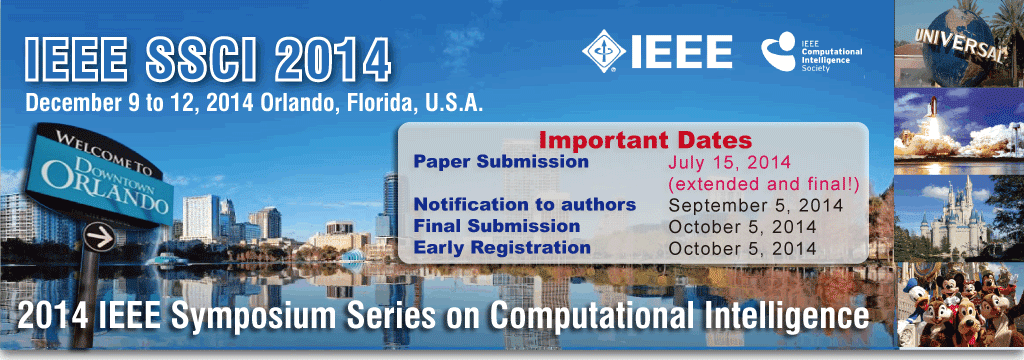- Home
- Final Submission Guidance
- Registration
- Program
- Presentation Guidelines
- Paper Submission
- Important Dates
- Organizing Committee
- Call for Special Sessions
- Call for Papers
- Plenary Speakers
- Keynote Speakers
- Special Sessions
- Doctoral Consortium
- Travel Grants
- Venue
- Accommodation
- Exhibitors
- Local Information
- Contact Us
International Symposium on
Independent Computing
(IEEE ISIC'2014)
December 9-12, 2014, Orlando, Florida, USA
As the famous slogan “Connecting People” indicates, a lot of the developments in novel technologies intensify the relationship between people without necessarily enhance technologies that are close to the nature of human beings. Recent paradigms, such as Cloud Computing that advances network infrastructure for data storage and resource sharing, or the Internet of Things that investigates the intelligence and awareness of objects involved in the network, provide such examples. With the help of advanced computational network paradigms, people tend to make themselves available online, which often manifests their willingness of placing almost everything (e.g., data, private information) on the Internet. This leads to the increasing dependency on more and more complex computer networking paradigms and associated techniques. Although considerable benefits are envisioned, issues concerning the survivability of humans in such environment, especially is emergency scenarios, remains a challenging issue.
The basic goal of independent computing is to study means, ways, mechanisms that prompts humans to be relatively independent of the Internet. These means, ways or mechanisms are also machines, but they should not be dependent entirely on the Internet (or clouds). In adisaster situation, such independence may become crucial for maintaining the minimum ability (support) of human beings.
The aim of the workshop is to investigate issues related to new computing paradigms, which can help to mitigate threats to human being and human society caused by their extensive dependence on the internet and computer networks. , Our goal is to come up with potential solutions to such problems. Interdisciplinary issues are expected to be the focus of the workshop. Three major issues will be discussed: (1) How can humans be shielded from the potential damage caused by the excessive information overload through various computer and internet channels; (2) How can human beings survive if the infrastructures of network and information are significantly damaged due to natural disasters (e.g., earthquake, tsunami,) or caused by adversary human activity (e.g., hacking, terrorist attacks); and (3) How can human beings survive if the Internet or part of it becomes self-aware (e.g., using our data without permission, trying to control human behaviors, etc.), and turns against human beings;
Subtitle:
Can we survive without internet?
Topics of interests:
A variety of perspectives will be taken into consideration to completely understand this emerging computing paradigm. Theme of the year entitles “Can we survive without internet?” investigates the ability at all levels (incl. fundamentals, techniques, and applications) between human and computer. Topics of interests include but are not limited to:
- Cross-disciplinary computing paradigms
- Understandings (infrastructure, framework, and etc.) of human-machine systems
- Understanding the impact of massive sensory information on human cognitive activity
- Methods towards definition between human and machine
- Human-machine or Machine-human scenarios analysis and design
- Human-awareness/intelligence versus Machine-awareness/intelligence
- Human-Machine sociology
- Applications, systems, and services
- Reliability, trust and security
- Computing for sustainability
Symposium Co-Organizers
 |
Robert KozmaThe University of Memphis, USA |
|---|---|
 |
Qiangfu ZhaoUniversity of Aizu, Japan |
 |
Cheng-Hsiung HsiehChaoyang University of Technology, Taiwan |
 |
Neil Y. YenThe University of Aizu, Japan |
External supports:
Task Force on Computational Intelligence, IEEE CIS
Technical Committee on Awareness Computing, IEEE SMCS
Top
Welcome to IEEE SSCI'14 in Orlando, Florida, December 9 to 12, 2014
Copyright © 2014 IEEE Symposium Series on Computational Intelligence
